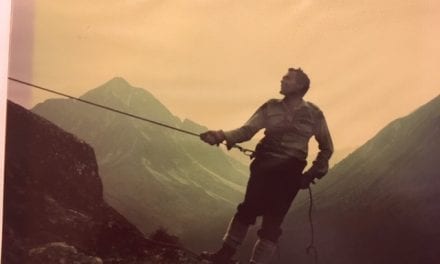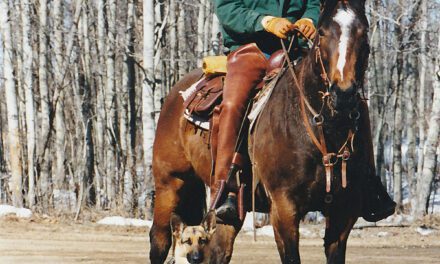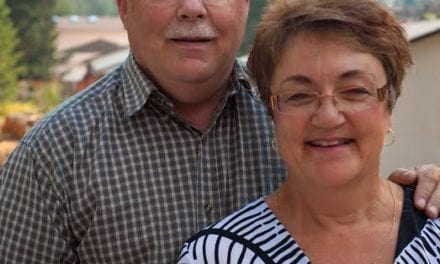Perry: “Did that come from working at the pony barn?”
Bill: “I was raised on a saddle horse. I lived four and a half miles from school and I rode to school every day for seven years and usually back again at night for some extracurricular activity. “When we were at Blue Creek at the end of the month I’d make two trips in one day. In to Blue Creek was twenty-one miles. I’d get up at 4 o’clock, have a bowl of cereal, jingle my horses, put the oat bag on – the packs were made up the night before – pack up and go to Blue Creek. Dump the pack boxes off, have a bowl of fruit and go back out. I still got to get back to Seldom Inn to take care of my girls. I’d have a sandwich, pack up the boxes again and get back in about 10 o’clock at night. Sixty some miles that day. When Bob Barker and I sent in our summaries at the end of the month, ‘You can’t have three hundred miles a month on horses,’ said Mickey McGuire.”
Perry: “What didn’t you like about the warden service?”
Bill: “I didn’t like climbing. I didn’t like to ski. People pay big money to do that and I just detested it. Someone’s got to get the stuff from the stores at the warden office to the mountain and there has got to be one or two guys qualified to do that. We knew where everything was, we knew what it was used for; I didn’t want to be hanging under helicopters – that was Tim Auger’s job. “When Tim was in Yoho he was a loner. He’d come down for coffee in the morning sometimes, stick around and then he was gone for the rest of the day, gone climbing or whatever. Back to Lake O’Hara; that was his domain up there.”
Perry: “A lot of the cowboy wardens – they didn’t like climbing. The Alpine Specialists from Austria or Germany were superb skiers – so I‘ve been told. Did you have to take climbing courses?”
Bill: “Hell yes! I’ve got certificates in that drawer there: from all my fire schools, all my climbing schools, all my law-enforcement schools.”
Perry: “So you actually had to do some climbing?”
Bill: “ Oh yeah, I could climb but I never enjoyed it; same with skiing. When we’d take school kids skiing at Lake Louise once a week a couple of wardens had to be with them so the ski patrol didn’t have to look after them. That was really great: here comes one of those kids screaming down the hill, ‘Come on warden! …. Let’s go!’ ”
Perry: “Were you involved in any rescues?”
Bill: “Not so many. There was one climbing one in Jasper; at the park gate going to Jasper. We had to go drag him off Roche Bonhomme or Roche Miette. Two guys were climbing and they were both going on the same rope when they fell off. One guy came out and said his buddy was dead, had fallen off and killed himself. Well, he had gone 100 yards after his buddy left; he was still alive. When we got up there the next day he was dead. If his buddy had stayed and taken care of him he might have lived.”
Cheryl: “What about the Takkakaw Falls one?”
Bill: “There was a call – a body up at Takkakaw Falls so we had to get a R.C.M. P. and go up to the falls. There was a guy up there, took a fall. We found out he was from Deer Lodge, Lake Louise. His buddy was gone. They were hippies. We never did find his buddy ‘til quite a few weeks later. “There was an Indian uprising at Chase, B.C., I think, at that time. The highway was closed. All the big-shot Mounties were there. We had to have an inspector or something come up out of Calgary (before the body could be moved). “So I’m sitting in the mist with three or four young Mounties. We had a little campfire going beside this body. We didn’t know what had killed him for sure yet. The skull was kind of soft. We found a great big rock with blood on it. He had been murdered. “I went home to get some long-johns and a parka. When I came back a couple of hours later the fire looked like some signal fire for some lost thing on the ocean. It was up four or five feet in the air. “ What,” I thought, “the hell is going on?” “Got just about up to the fire, stepped on a stick and it snapped. I heard that .308 go ‘ch, ch, ch’. “Hold on! Hold on! “ I yelled. “What’s going on here?” “Oh, it’s you. We were worried about bears.” “A packrat was coming around and chewing on the dead guy’s ear. So one of the Mounties got his .38 out. “What are you doing?” I asked. “I’m going to shoot it! “What killed that guy?” I said. “Not sure: probably got his head caved in.” “So I says, ‘With a .38 slug in his ear we will have another probable cause of death.’ “He put his gun away.”
Perry: “What about searches?”
Bill: “At O’Hara there was a kid missing. I think Tim Auger got called. So I got a saddle horse; the rest of the guys were walking – Gord Rutherford and Tim and all those guys. The kid was about ten and diabetic. We’re getting in touch with the parents and trying to find everything we can about the boy. “We’re told, ‘That kid will be okay. He can look after himself in the mountains. He’s a smart kid.’ “The kid’s mother thought he had died. I’m going to get my horse and go over to the Ottertail. The other guys are covering the short trails down around the lake. I say to her, ‘Is there anything I should know?’
“Well, he might need sugar.” “She hands me a couple of oranges. ‘This will help if you find him.’ So I head off towards the Ottertail and I’m hollering his name. “What!” I hear right off the side of the trail. It scared the Bejesus out of me. He had sense enough to go up a tree. His dad said, ‘Be careful with him around that horse; he doesn’t like horses’. I get him down. ‘Want to get on the horse with me? Jump up behind and we will play cowboy.’ “Okay!” He inhaled the two oranges; they were gone. He got up on the horse. I had told them ‘If I find him I will fire two shots,’ but I was told he doesn’t like loud noises. I showed him my pistol. “I’m going to shoot this to let them know I found you.” “Okay!” So I shot two shots. He said, ‘Do it again! Do it again!’ When we got back down to where their camp was (his) mom and dad were mauling him all over and I said, ‘He’s a man.’ That was a good job.
Another one in Elk Island, the kid went missing in a campground. We got all our guys and started searching. We walked Elk Island for just over two days with hundreds of volunteers and never found him. Somebody said they thought they found him in a beaver run twenty years later but I don’t know whether that’s true. My idea is: someone there with their camper….he was a street kid; never had any home life….they were pulling out: he got in and went for a ride.
Cheryl: “The mum and dad were druggies. There was that body at Yoho: over the embankment in a car.”
Bill: “A kid comes into the warden office one morning and says, “I’m looking for my girlfriend.” We’re having coffee; haven’t heard anything so we ask, ‘What are you talking about?’ “They were in Banff several days ago. His best friend was picking up his girlfriend and bringing her from Vancouver but they never showed up. “He says, ‘I stopped at every police station from Vancouver to here and nobody would help me: they said “They’ve run off together. Don’t worry about it.” ’
Rutherford and Dixon jump in the truck and went off up the hill checking the highway. I got Wayne the Mountie to go with me and we headed west. We went around Finn Creek Corner. When you go around the corner there is a hump left when they built the road. There are tracks in the ditch. I say, ‘Maybe they’re behind that hill. Let’s go check it out!’ They would have come around that corner – he was likely going to sleep, put it over and down they went maybe 20-50 feet into the rocks. They were lying on the rocks for two or three days in the summer. We got the coroner to come up from Golden. He got out a couple of body bags and said, ‘You guys already got the stink; you bag them.’ It was just like being around a dead grizzly or a dead skunk: when you are into the smell after a while it goes away. So we got them bagged up and into the coroner’s car. Both the Mountie and I had great big moustaches. The next morning I had coffee with R. C. M. P. officer Wayne. I was clean-shaven and didn’t have my teeth in and Wayne was clean- shaven. We kind of looked at each other and started laughing. “Where’s your teeth?” “As soon as I put them in my mouth, after two seconds I could taste that guy.”
Cheryl: “And the moustache had the smell. I don’t know if you ever grew one again.”
Perry: “What changes did you go through when you were working in the warden service?”
Bill: “I hired on as a park warden and don’t know what I was when I quit. There is not a warden in the warden service any more.”
Perry: “Nowadays a warden is the law enforcement guy.”
Bill: I had my .44 with me all the time I was in the bush. Mickey, the chief warden, he hated pistols.”
Cheryl: “We couldn’t have a skidoo. He was supposed to get an apartment in Jasper and work out at Blue Creek.”
Bill: “In wintertime it was sixty-five miles by skidoo.”
Cheryl: “So he got his own skidoo and built a sleigh.”
Bill: “If you lived back there you better have a trail and it better be solid.”
Perry: “Did you go through decentralization?”
Cheryl: “We left in ’81. We didn’t have to go through that.”
Perry: “Did you retire in ’81, Bill?”
Cheryl: “No, he quit. He had a bad chief warden and superintendent in Elk Island. Three quit. That should have told Calgary something.”
Bill: “Within one year three senior wardens quit.”
Cheryl: “Fred Dixon, Ed Henderson . . .”
Bill: “and Monrad. We were at a warden party in Yoho and Mike Schintz was there. He was in Jasper when I was in Jasper. He was one of my mentors; I learned how to ski from Mike. Mike said, ‘How come you quit? Why didn’t you come to regional office?’
Bill: “I tried for three months to get a transfer. There was nothing available.” Mike replied, “If you had walked through the door of regional office you would have been transferred before you walked out.”
Bill: “I didn’t know that. Those guys were trying to get rid of the old wardens. They wanted the new guys with their computers and stuff. Fred Dixon (one of the wardens who quit); he’s the one got gored.”
Cheryl: “And Bill saved his life; Ann Dixon wrote the story and called it the ‘Great Save.‘ ”
Perry: “How did you save him?”
Bill: “Put him in a truck and got him out of there.”
Cheryl: “After he had been gored.”
Bill: “We bought a new squeeze for Wood Buffalo and there was one of them [buffalo] running around the yard one morning so we thought. ‘Let’s run him in and try the new squeeze. A big bull buffalo.”
Cheryl: “A wood bison.”
Bill: “Seven and a half or more feet at the hump. So we run him in; one of those old buffaloes. He’s walking through the corrals, into the chutes and the squeeze. In our squeeze we had a nose cone as part of the trap: 2 1/2 inch pipe, a diamond mesh screen and then bullet-proof plexiglass. horns couldn’t break it. “I got him tagged!” I yelled to Fred. “Yeah, okay.”
“I’m going up on top to make sure the gates are all open so he doesn’t get stuck in the chutes. “Okay, turn him loose!”
“I’m on the catwalk and I heard Fred holler. I went over and he is laying down on the ground, the bull is rooting at him and then he turned and walked away (a short distance). He’s in a little wire alley. Fred opened the gate to let him out; he flings the gate open and steps behind it. The bull just walked out in slow motion, turned around the corner and comes back in and starts rooting at Fred. I didn’t see that. He hit him here (the bull gores Fred). The bull’s horn was that big at the base (making a circle the size of a baseball with his fingers). As big at the top as a shovel handle…round…it was not pointed
“It came in here (indicating his side below his belt) run right up and just missed his heart.”
Cheryl: “It missed every organ. It was a miracle.”
Bill: “The bull at that particular time was growling (Bill makes a guttural sound in imitation of the bull). He was doing that all the time. Fred got up. I didn’t know he had been gored. He gets hold of the fence, reaches up on the seven foot page wire; takes one step up on it and the wire creaked. The bull turned around and sees him and comes back just like that, hooked him and threw him up in the air. Well Fred had hold of the fence, where it was flipped down from the top. I don’t know how he was going to get away hanging onto that fence. The bull flipped him back down on the fence where Fred was hanging onto it. “I seen this and Fred rolled over the top of the fence. The bull had not got around to the opening where Fred was. My truck was over here. I didn’t know he was hurt. He was in shock. “I thought, ‘I got to get my rifle.’ So I get down off the top of the chutes. By the time I get to my truck the bull is coming around the end of that little short fence. I haven’t got time to get my rifle. The bull is not charging; he is just swinging his head and moaning. My truck box had a false floor of 2 by 6’s. In the center was a large piece cut out for a ball hitch for a 5th wheel trailer. The rest was full of sand for weight. No end gate on the truck. That bull’s coming. If he gets to him (Fred) before I do I’ll drive over top of him with the truck. I will do something. So I get there; Fred is there; the bull’s there. “Get in the back! Get in the back of the truck!” “He still doesn’t know the bull’s there. He rolls up into the back of the truck and he says the worse thing of the whole ordeal was when he could see that bull from the back of the truck. I took off; he could feel his butt coming out of that hole in the back of the truck. Anyways, I went down four or five hundred yards to the gate. Fred started coming round the side of the truck. “I said, ‘Aren’t you going to get the gate? I’m going to get my rifle and go back and shoot that son of the bitch. He’s going to hurt somebody.”




Bill was the first person I worked for when I became a warden in Yoho. But that was only for two weeks before I went to Waterton.
Great writing.
Bill was my mentor and District Warden I worked under in Yoho as a seasonal warden.
Summer of 1973 & 1974.
He was a great person.
Got to meet with him and Cheryl one evening in Magrath.
It had been almost 40 years since we had seen one another.
Called him up on the phone and this some what the way the call went,
” Hello is this Bill walburger?”
“I was when I woke up this morning.”
I introduced myself as a voice from past and spend a couple hours visiting with them.
Miss Bill, he was the real thing.
I only stayed in the warden service as a seasonal from 1972 > 1975.
There was nobody like the originals Hal Shepard Jack Woledge, Gord Rutherford, Dale Portman, Gordon Peyto, etc.
NOTE:E-mail julianrichaud@hotmail.com